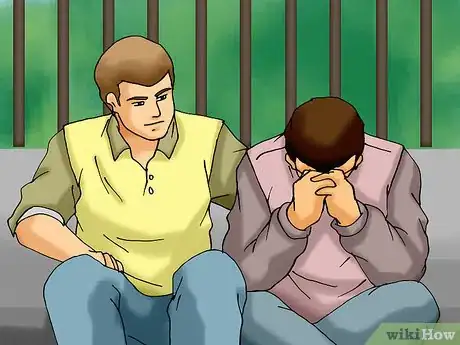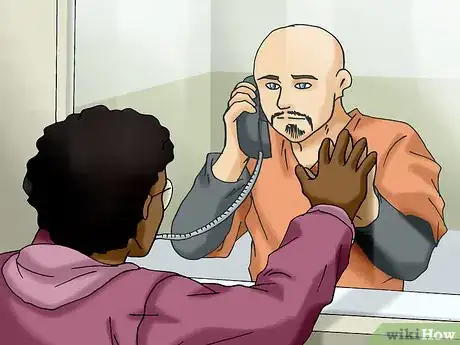X
wikiHow is a “wiki,” similar to Wikipedia, which means that many of our articles are co-written by multiple authors. To create this article, 14 people, some anonymous, worked to edit and improve it over time.
There are 8 references cited in this article, which can be found at the bottom of the page.
This article has been viewed 35,770 times.
Learn more...
Dealing with sin can ultimately be a humbling and positive journey. You can strive to stop sinning or deal with sin in someone else in an empathetic and forgiving manner. Don't expect perfection. However, double down in your commitment to deal with sin positively.
Steps
Part 1
Part 1 of 3:
Learning More About Sin
-
1Understand what sin is, and don't take it lightly. Many religions have definitions of sin, and there are general societal norms for morality also that might vary from culture to culture. In order to deal with sin, it must first be identified, and then acknowledged.[1]
- There are right and wrong reasons for everything, and any coping method you use will be more effective if you are sincere about wanting to address the sin. For example, you'll find the process harder if you're only sorry you were caught. Ideally, your reason would be along the lines of bettering yourself or pleasing God, if you are religious.[2]
- Sin is not a concept to take lightly if you want to live free from condemnation and at peace with yourself and others. Some sins can really hurt others and yourself. Be ever wary of these, and don't minimize the damage that's been caused. Sin is often a selfish act; if you find yourself doing something that hurts someone else but satisfies a want of yours, that's probably a sin (same if someone else is doing it).
- If you are religious, seek out a religious text, like the Bible, or religious authorities, and truly understand their definitions of sin. While most people believe that sin is the 'bad stuff' people do, sin is much more than that in many religions. Sin is any deviation from the perfection (wholeness/completeness) of God. So while sins can be actions, thoughts and attitudes can be sinful, as well. The root of sin is the human desire to put oneself ahead of others.
-
2Figure out why you or the other person has sinned. Sin doesn't exist in a vacuum. People sin – especially if it's habitual sin – because of underlying problems or issues, in many cases.
- Sin, especially habitual sin, is often the symptom of a much greater issue in a person's life. Examine your life. What sins have you been committing? What are the causes of these sins? Really dig deep, and ask yourself the hard questions.
- If the sin came from someone else, help that person examine his or her life and the underlying reasons that might have led him or her to sin. This can be much more effective than responding to sin with blame and anger.[3]
Advertisement -
3Lighten up on yourself or the other person. Understand that everyone can fall. Secondly, we have to acknowledge that we don't have what it takes to defeat sin entirely. This principle is key; it will lead us to a humble life, overflowing with gratitude.
- Don't ever dismiss yourself, or another person, as doomed to Hell. Only God chooses that, and, as much as we think we understand what can get you there, it is not our place.
- One of the best ways to get over a sin is not to think too much about what you did, but what you did not do. If you already know how to correct your particular sin, then simply do so. It will be hard, but do not give up; giving up hope is by far the worst possible sin. Try to make up for the sin as inconspicuously as possible.
-
4Get help for the sin or encourage the other person to get help. Some sins, such as addictions, take other people to overcome and understand them. Find someone you trust to assist you, and be cautious of mentioning your struggle around judgmental people.
- Overcoming sin isn't a shameful thing, and you certainly don't need unnecessary negative input if it can be avoided. Find balance. On one hand, you don't want to ignore your sins, as they can and will drag you down, but on the other hand, you need to not be too hard on yourself. If you're doing your best, you're on the right path.
- Talk to God if you are religious. God isn't unapproachable, although He does want to be treated with respect. Spend time every day for personal prayer and scripture study. To study the scriptures, you can either read it from front to back, or you can use the Topical Guide to look up key words or phrases. So long as you're sincerely paying attention to what you're reading, there really isn't a wrong way to do it.
- If you cannot stop yourself from committing a certain sin or a past sin seems to be taking over your life, don't be too proud to seek help if you are not religious. Psychiatrists are not looking to expose you in any way and may be able to help you conquer your struggles.
Advertisement
Part 2
Part 2 of 3:
Dealing with Sin in Others
-
1Help the sinner if the sinner comes to you, but try to avoid scolding. Tell the sinner gently if you think what he or she did was wrong, but there is usually no need to repeat yourself. Avoid overt judging words.
- Show the sinner what to do if they ask. If you come on too heavy, or mention Hell to them, it could damage the relationship.
- If someone was injured or hurt as a result of the sin, help that person. If the sinner doesn't yet feel the need to repent, avoid situations that might cause you or your family to get hurt by the other person.
-
2Help the sinner recognize what sin is. You can subtly educate the sinner about how to repent, without driving them away.
- Do this in a kind and helpful manner, without using overt judging words or castigating the sinner. Instead, explain what religious texts say about sin.
- Couch your comments in empathy. Let the sinner know how you see the sin harming them and others around them. Focus on the good you see in them and on the potential the sinner can realize.
-
3Forgive the sinner, especially if they repent. This may take time, especially if they hurt you, but you're not helping anyone by holding a grudge. Be open to restitution. Letting go of anger heals you, first and foremost.[4]
- Forgiveness doesn't mean that what they did was okay; forgiveness is often for your own peace of mind. Don't judge. Don't be in any way cruel to the sinner because of his or her decisions. The sinner is still a human being.[5]
- Do not press matters as that will make it worse. Patience and respect are the best cures for another's sin. Wait for signs of improvement (or lack thereof), and respect that the other person would have just as hard a time as you would, if not harder. When the time comes and the person has made the first change, congratulate the person (calmly, no parties) for working towards the better.
Advertisement
Part 3
Part 3 of 3:
Dealing With Sin in Yourself
-
1Admit that you've sinned. Firstly, you need to acknowledge that indeed, you have sinned, whether against yourself, others or God. The very fact you are asking the question means you recognize that something is amiss in your life. This is most encouraging.
- One of the most difficult things good people have to face is the fact that we all sin. Good people do not easily see that they in fact commit sin. Identify what the sin is. Ask for forgiveness.
- This means admitting you did something wrong, to the people you hurt, if applicable, and then confess it to God, if you are religious. Life is hard. We've all had times when we've done things we know we shouldn't have.
-
2Resolve not to do that wrong, or sinful, thing again. If completely stopping the sin is not possible overnight, resolve to do and be better. God wants us to grow and be better, but He understands that perfection is a process.
- Once you have done this and know in your heart you are forgiven, you may make restitution where appropriate. It is advisable to remain on your knees before God until you feel forgiven, if that's your religious belief.
- No trite “I am sorry” is going to be okay. It needs to be a complete turning from what you did, leaving it behind through a 180-degree turn going in the opposite direction.[6]
-
3Avoid being in the situation to sin again. If it's getting drunk, don't go to places where you can buy alcohol. If it's sleeping around or adultery, then don't be alone with the person who tempts you.
- If it's greed, find a way to figure out what is triggering those greedy episodes, and then set your mind to avoid those situations. Lying? Take a breath before answering. Weigh it out in your mind before you tell that next lie. Ask yourself, is that sin more important than your soul?
- It's good to get an accountability partner to help. This could be someone who has been involved in your religion longer than you. If you are Catholic, this may mean Confession. Talk to someone. While it may be hard to trust people these days, if you know someone who will take your secret to the grave (lucky you) then tell him or her! You may be surprised with the advice the person has to offer. If you don't have anyone to talk to about this, you're definitely not alone. Try writing about it.
-
4Try using the power of prayer or meditation.[7] Prayer actually does work. Asking God to help you control your impulses (i.e. drinking or gambling) is the first step if you are religious.
- However, it is you who ultimately chooses whether to fight against the sin or let it slide. God can lend a hand yes, but mostly He lets you have the choice. And it's not a quick-fix all of the time, as it will take work.[8]
- If someone else is sinning, then pray for them. Ask God to help open their eyes as well, but also yours. Nobody should be bashed for their beliefs/values/ideas, so secretly praying and continuing to love that person unconditionally whether a friend, family member or spouse, can go a long way.
-
5Do good deeds to counterbalance the sin. If you've sinned, and you feel really badly about it, try to do some positive things for other people.
- This will help focus your energy on good behaviors instead of the sin, and it could reduce your risk of re-offending. Fill your mind and life with good things.
- Don't brag or boast about these good works. Do them quietly, and with humility.
Advertisement
Community Q&A
-
QuestionWould it be a sin cast a spell humbly asking for something and celebrating God, but only spellcasting to the Christian Lord God?
 Community AnswerIt depends on who you ask, but many Christians consider any form of witchcraft to be a sin in the eyes of God.
Community AnswerIt depends on who you ask, but many Christians consider any form of witchcraft to be a sin in the eyes of God. -
QuestionIs it a sin to watch porn videos?
 ZackTop AnswererYes. In pornography, women are treated as objects merely valued for their ability to gratify carnal desire, which is very wrong. Pornography is intended to stir up desires that cannot be fulfilled in a spiritually-healthy relationship. Porn is very selfish, and selfishness is sinful.
ZackTop AnswererYes. In pornography, women are treated as objects merely valued for their ability to gratify carnal desire, which is very wrong. Pornography is intended to stir up desires that cannot be fulfilled in a spiritually-healthy relationship. Porn is very selfish, and selfishness is sinful. -
QuestionIs it a sin to be gay?
 Community AnswerIt depends on who you ask. Some denominations believe there is Biblical evidence to support the idea that homosexuality is a sin, but others disagree.
Community AnswerIt depends on who you ask. Some denominations believe there is Biblical evidence to support the idea that homosexuality is a sin, but others disagree.
Advertisement
Warnings
- Understand that the way people define sin can differ depending on religious belief.⧼thumbs_response⧽
- If you feel suicidal about it, get help immediately. Lighten up on yourself. Almost everyone has sinned at some time in their life.⧼thumbs_response⧽
Advertisement
References
- ↑ http://www.allaboutgod.com/what-is-sin.htm
- ↑ http://www.ucg.org/the-good-news/why-do-we-sin
- ↑ http://www.christianpost.com/news/how-satan-entices-people-into-sin-104652/
- ↑ https://www.psychologytoday.com/basics/forgiveness
- ↑ http://www.biblestudytools.com/topical-verses/forgiveness-bible-verses/
- ↑ http://www.mayoclinic.org/healthy-lifestyle/adult-health/in-depth/forgiveness/art-20047692
- ↑ https://www.psychologytoday.com/basics/meditation
- ↑ http://www.prayeronline.org.au/how-to-pray
About This Article
Advertisement







































































